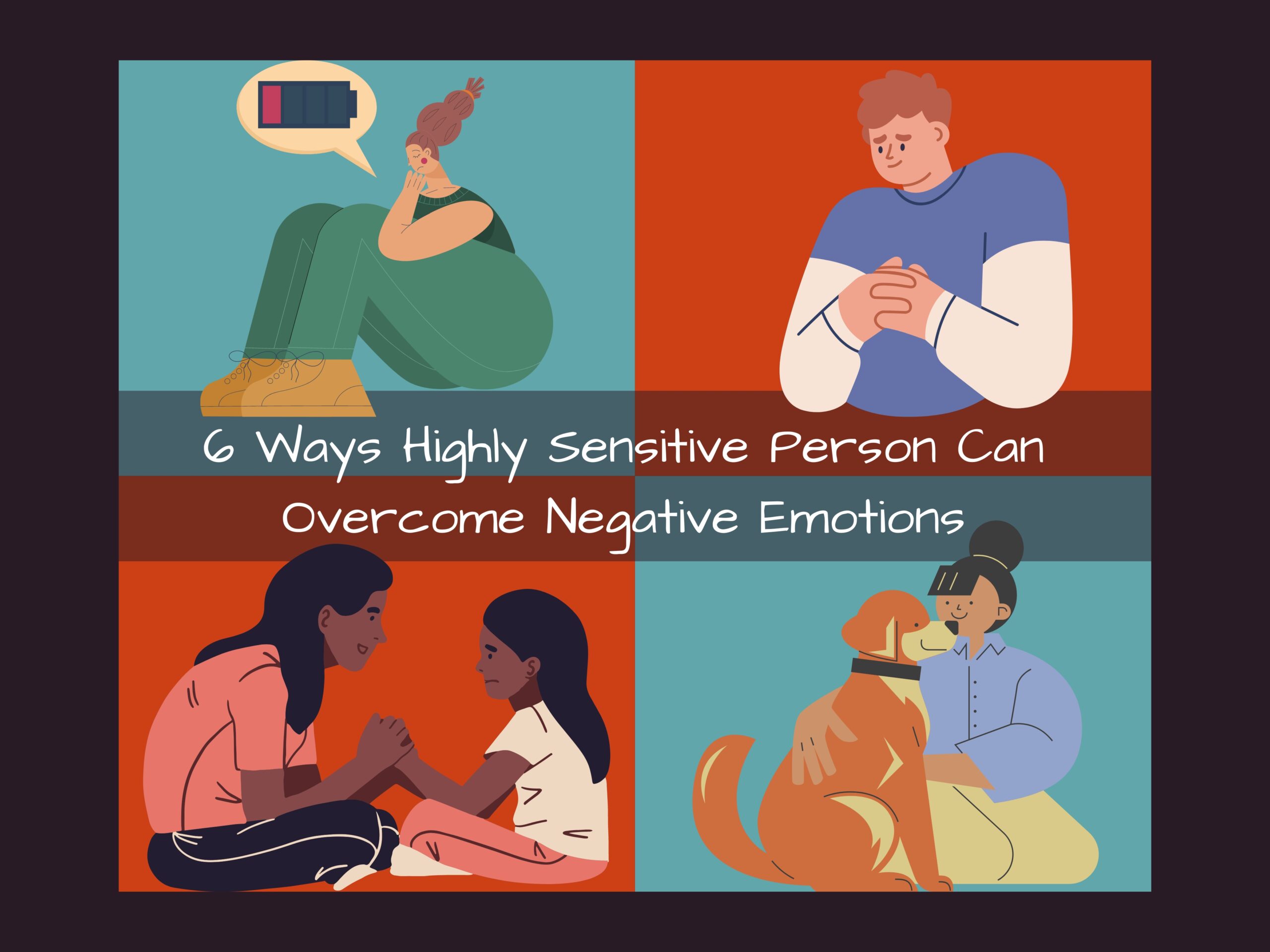If you overthink, are highly perceptive, overtly empathetic to others, and cannot tolerate negative criticism, then chances are you are an HSP or Highly Sensitive Person.
In today’s world, where we are constantly exposed to all kinds of stimuli, some individuals possess a more profound and increased response that sets them apart. A person with an increased C.N.S. (central nervous system) sensitivity to physical, emotional, environmental, or social stimuli is called an HSP or Highly sensitive person. While an HSP can be a kind and caring human being for others, their sensitivity puts them at risk of negative emotions for themselves.
About HSP
Intense C.N.S. sensitivity in HSP individuals is considered a neurodivergent feature, also called sensory processing sensitivity or S.P.S. The term HSP was coined by psychologists Elaine Aron and Arthur Aron in the mid-1990s. Since then, psychological interest in the phenomenon has grown among the psychiatric fraternity. According to research by Elaine Aron, HSP people display increased emotional sensitivity and stronger reactivity to external and internal stimuli than the rest of the population.
Traits of a Highly Sensitive Person
Several traits and characteristics can identify a Highly Sensitive Person, however, researchers have pinpointed the most common ones displayed by a majority. Moreover, the Aarons devised a test known as Aron’s Highly Sensitive Person Scale (H.S.P.S.), which is a more accurate analysis of an HSP. Elaine Aron also went a step further, outlining D.O.E.S. as an excellent way to summarize the personality of an HSP.
- D – Depth of Processing: HSPs have a highly active insula, the part of the brain that helps increase perception and self-awareness. This makes them think more before responding, leading to slower decision-making and task transition time.
- O– Overstimulation: An HSP is overstimulated by their social environment, which leads to mental exhaustion.
- E – Emotional Responsiveness/Empathy: HSPs have more active mirror neurons in their brains, making them empathize more with people than others. They feel more intense positive and negative emotions than non-HSPs.
- S – Sensitive to Subtleties/Sensory Stimuli: HSP quickly notices the finer details missed by others. They are also more responsive to sensory input, such as loud noise, strong odors, and rough textures.
Impact of Negative Emotions on an HSP and What Causes It?
Because an HSP is always so sensitive to their physical, social, and emotional environment, they are always at risk of negative emotions from external and internal triggers. Here are some critical ways that an HSP might invite negativity.
- Emotional Exhaustion: Due to excessive stimulation, what might seem a typical day for others might be too intense for an HSP leaving them emotionally drained and exhausted
- Easily Overwhelmed: An HSP is easily overwhelmed in most areas of life. Even pleasant experiences can sometimes be stressful. Being flustered constantly can cause general anxiety, stress, poor digestion, low immunity, and poor concentration.
- Conflicts: HSP senses relationship problems faster, especially when things seem slightly off. This makes them prone to worry more and unhappiness in a relationship.
- Sensitivity to Criticism: An HSP always requires validation and is deeply affected by negative criticism. This creates a sense of self-doubt, fear of efficiency, low self-esteem, and even rejection.
- Prone To Worry: Anxiety is a common problem with an HSP who reacts more anxiously than others to something concerning or frustrating. Moreover, it takes longer for an HSP to recover from anxiety simply because it will require more calming stimuli to induce positive feelings.
- Anxiety From Communication: HSPs are constantly anxious during communication with friends and colleagues. Attempting social behavior increases an HSP’s anxiety, leading to guilt later, especially when it involves people who matter to them. This also results in an HSP being an introvert.
- Failure Of Self-Priority: An HSP finds it hard to say “No.” Their self-sacrificing character and inability to identify one’s needs lead to frustration, anger, and resentment.
- Anxiety and Depression: Anxiety and depression are common in an HSP without emotional support to their sensitivity during childhood and adult relationships.
- Loneliness And Feeling Misunderstood: HSPs often struggle with loneliness which usually stems from being misunderstood by peers, family, and colleagues. This also leads to low self-esteem.
6 Positive Ways Highly Sensitive Person Can Overcome Negative Emotions
A highly sensitive person can do much to remove the negativity from their lives simply by avoiding what bothers them most. Here are six significant ways an HSP can induce more positivity into their lives.
1. Avoid the Source of Negativity
As a Highly Sensitive Person (HSP), it’s essential to let go of the fear of unintentionally offending others. You will always find energy vampires in life, which must be avoided at all costs. Physical and social proximity to such people increases the absorption of negativity. Avoid emotionally demanding people who make you feel bad. Moreover, avoid stimuli such as slasher and violent movies; these aren’t your cup of tea.
2. Practice More Self-care and Set Boundaries
HSPs should practice self-care to regulate their emotions. Self-care practices include practicing mindfulness, engaging in creative pursuits such as hobbies, going for nature walks, and indulging in relaxing and de-stressing activities. Setting healthy boundaries and learning to say “NO” when overwhelmed can also help protect your emotional well-being.
3. A Healthy Diet
The health of men and women may appear different to highly sensitive individuals. Due to intense physiological effects, HSPs may need to limit or eradicate their caffeine consumption. In addition to frequent meals that prevent distress from hunger signals, anti-inflammatory foods can also calm the nervous system.
4. Watch Out for Extreme Thinking
Thinking in extremes also termed “black and white thinking” can make an HSP feel stuck in their emotions. An example of thinking in extremes is “I am a brilliant success, or I am an utter failure.” This is a distorted cognitive process that can only worsen your negativity. Avoid using extreme words such as “ruined,” “perfect,” or “never.” It is quite often that your reality lies somewhere in between. We can never always control the outcome or what happens in every situation, so burdening yourself with what you cannot control is pointless. Instead, try creating solutions by asking yourself what part of the task you control. What can I do about it? You will see how to move forward once you stop feeling powerless about a situation.
5. Practice “Guerilla Meditation”
Guerilla meditation is a five-minute act of mindfulness that can be practiced anywhere. If you are due for a crowded and noisy social event, find a sweet spot, such as an empty room, and tune into your spirit and your heart. Meditate and be mindful of yourself at that moment to become strong mentally and emotionally. Calm down, and focus on the positive aspects of yourself and your life. Perform deep breathing, which is the gold standard of relaxation. Learn to give yourself more private time regardless of how hectic your daily routine may be. Your “me time” is essential to your well-being. It helps restore your mental energy and prepares you emotionally for the next day.
6. Talk to Loved Ones Who Understand
There can never be better support than a loved one who cares about you. As an HSP, you are always empathic to the needs of others. Well? You need the same too. Speak to a best friend or a family member you relate to the most. Friends and family are better equipped to provide emotional support and give you the space to handle your internal conflicts.
Conclusion
A highly sensitive person comes with pitfalls and advantages. However, HSP is not a disease, and neither is it a weakness. By understanding character traits and identifying the stressors and triggers of negativity, an HSP can learn to embrace their sensitivity better. Abiding by these coping strategies and confiding in loved ones, helps an HSP thrive to use their sensitivity as a powerful mechanism to connect better with the world.















